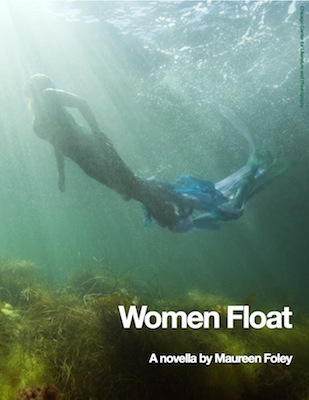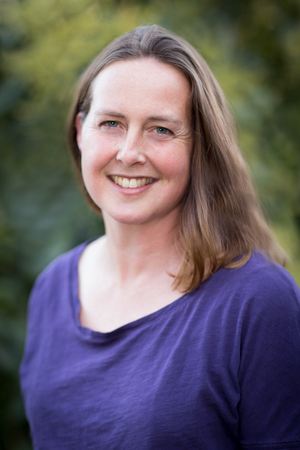| « Bookmarks | Witness the Matrix of Technology and Writing at Notes from the Mainframe » |
Author Mon Jan 27 2014
A Stop on the Women Float Blog Tour with Guest Essayist Maureen Foley
Last spring the Chicago Center for Literature and Photography released Women Float, Maureen Foley's fiction debut. Today we welcome Foley as she stops at Book Club on her blog tour promoting the novella (click here to see other tour stops and dates).
Foley is a writer and artist living on an avocado ranch with her family in Southern California. She is the author of the poetry chapbook Epileptic and her writing has appeared in Wired, The New York Times and elsewhere. She received a Master of Fine Arts in prose from Naropa University, and now teaches creative writing, visual art and bookmaking in Santa Barbara County.
Women Float touches on female relationships and the drama of becoming an adult. Protagonist Win, a lesbian pastry chef in California, is afraid of swimming, a phobia underscored by the fact that her absent mother was a professional surfer. Win's journey takes her from her mother's abandonment at age 9, into her adulthood struggle to overcome hydrophobia. Mix in a relationship with her New Age neighbor and a penchant for pathological lying, and you've got an entertaining romance with none of the cheesiness of a supermarket paperback.
We're honored to feature Foley's essay Who Says Who Writes What below.
In it she discusses her choice to address gender and sexuality in her work, which is new territory for her. This personal narrative focuses as much on Foley's choices as a writer as it does on the meaning of being a contemporary female author. Enjoy!
I start with a confession: I am not a lesbian. Despite writing and publishing Women Float, a book featuring a queer main character, Win, I do not lust for ladies. There. I've done it. I've stated my true sexual orientation. Still, what to call it? Not coming out of the closet, but going in? What is the relationship of straight people to closets at all? Clearly, we all have them. Maybe I never had my own lesbian closet but I just stepped out of my own great closet of sexual plurality spectrum disorders.
Do I sound slightly defensive? Or confused? I am. After all, as a straight woman telling the story of a lesbian pastry chef, I am afraid that I don't actually have the right to tell my character's story. Also, I'm afraid that I lose authority over my voice by boldly proclaiming my non-gay sexuality. I'm worried that I'll be called out as a fake, a poser, a wannabe, or worse, as someone trying to appropriate queerness for my own frivolous uses. After all, as a straight person, there are many reasons not to write a gay character into being. But there are also many reasons to go for it. Let me elaborate on a few of the problems and issues I encountered in bringing Win to life.
First, there's the generic writer's take on the whole thing. I am aware that there are people who don't believe that an author should plunge into territory they have not themselves walked. It goes against that old 'write what you know' adage. And I surely don't know what it's like to love another woman, at least not in that steamy, sexy way. But I have done research and I believe that love is love, so the emotion behind Women Float rings true, even if the love object has been changed to protect the innocent.
Then there's the intellectual problem with making Win gay-- it's all about the right of the dominant group to use the words and ideas and voice of the minority. I understand that published words take on a life of their own and, used incorrectly, can further serve to denigrate, insult, slander or invalidate a marginalized group. But I believe that a person is more than their sexual orientation and that Win represents just one woman, not all lesbians. I tried to avoid making a caricature or stereotypical lesbian woman by keeping her details authentic, specific and true-to-life.
Far from any lofty goal of furthering the cause of equality between straight and gay people, I wrote Women Float as an all-female romance story because I simply liked the idea of a book that dealt exclusively with women in an honest way. I also wanted to write a love story that hadn't been told a gazillion times (even though I now realize that every love story is generic but its universality is what makes it so beautiful.) I also first wrote the story in the late 1990s, as a college student, when the idea of being bi-curious was the norm (Or was that just my group of friends?).
In any case, Win and Women Float are now my authorial offspring and I've taken a dive, head first, into the heady waters of queer lit. Part of me feels flummoxed by the very real truth that my novella is now categorized, not as simply literature, but as some sub-genre. But then again, as a female author, this would have happened no matter what. See what I just did? Female. Author. Regardless of sexual orientation, women have a million more stories to write (and publish).
Finally, my real hope is that by the time my two-year-old daughter reads Women Float our culture will have evolved enough so that reading about Win's homosexuality will be the same as learning her hair color. Just a simple delineation of a part of one literary character's much larger whole. Because any insecurity on my part about who can write what says more about the times we're in than the simple, timeless character I created. If Win's queerness expands, in tiny terms, the pantheon of authentic women's voices in contemporary fiction, then I feel that Women Float has succeeded by bringing real women out of any narrow closet and into the eternity of language.
All photos provided by the Chicago Center for Literature and Photography











